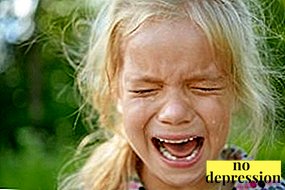Literally every parent encountered children's tantrums.
But one-time surges of emotions that are not difficult to repay are one thing, but real hysterical fit - quite another thing.
In order not to confuse whims and self-indulgence with serious psychological problems in a child, it is necessary to sort out the question properly.
The concept of child hysteria

Hysteria is called state of irritability, which is accompanied by seizures, nervous laughter, alternating with crying, an unstable emotional state - rage, anger, aggression, severe tearfulness.
Hysteria develops in most cases in children who are too emotional about events. For hysteria characteristic symptoms of diseases that are absent in reality.
It is explained by a certain mental disorder. This phenomenon can be explained by the age-related weakness of the cerebral cortex during the predominance of subcortical impulses.
Surely children's hysteria is not a sentence. The state needs not only medical and psychological correction, but also the possession of parents of certain behavioral patterns at the time of hysteria in a child.
Why is the child constantly hysterical?
Are there any reasons or this behavior arises for no reason? Children's hysteria is expressed by various conditions. affective character. There is an alternation of anger, rage, laughter.
Some parents regard this behavior as a theatrical play of a child who simply wants to attract attention.
But if hysteria is delayed, while mom and dad look at her through their fingers, the child’s condition can provoke a seizure with convulsions, stuttering and even paralysis of the limbs.
Specialists to reasons of hysteria include:
- individual mental characteristics of the baby;
- natural tendency to theatrical behavior;
- severe stress of a sudden nature;
- long stress without a competent reaction to it.

Sometimes hysteria in a child stops by itself. For example, the baby’s seizures were a kind of reaction to swearing parents. The child is not yet smart enough to more adequately respond to the nervous environment.
When peace reigns in the family, hysterics also pass - a very common situation. But there is a reverse case: it is necessary to remind the child, even between words, about some traumatic event for him, as hysteria arises again.
There are almost always causes of hysteria. - but not always her parents can isolate her.
Hysterical neurosis: symptoms and treatment
The peculiarity of this disease is that, despite all the brightness of the symptoms, the symptoms themselves are imaginary.
Expressed hysteria in the following manifestations:
- reduced muscle strength in the arms or legs;
- numbness of the skin is observed;
- gait is disturbed;
- soreness can be felt in different parts of the body;
- visual dysfunction (up to temporary blindness);
- changes in the auditory analyzer;
- disturbed speech;
- partial memory loss.

If a child suddenly starts shouting that he has a stomach or headache, to relieve this pain with painkillers is impossible.
A child with hysteria can begin seizures, resulting in loss of consciousness.
But, as already mentioned, symptoms imaginary. If the patient falls to the floor, then he does it as if deliberately: slowly, without the risk of falling violently and hitting. If a child has a true seizure, then he falls sharply, maybe even bite his tongue or urinate involuntarily.
The treatment of hysterical neurosis should deal with a child psychiatrist. It is based on certain psychotherapeutic techniques in the form of confidential conversations.
The doctor will try to gently identify the causes of hysterical behavior. Can baby be assigned special medications - sedatives and even antidepressants.
It is very important that during the treatment period the parents create a calm, favorable environment in the house.
Practical advice to parents
Of course, not always at the moment of a hysterical incident a child will have the opportunity to see a doctor. because the parent must understand the tantrum mechanism, to know at which stage it will be effective.
The stadiality of children's tantrums:
- Screams. This is the initial stage of hysteria, when the child stops hearing someone, screaming loudly, scaring others, but he does not state any requirements.
- Motor stimulation. At this stage, the child falls to the floor, can beat his head on various objects, pull hair. He does not feel pain at this moment.
- Sobs. The child goes into loud, non-stop sobs. His appearance expresses discontent, strong offense. He cannot extinguish this condition himself, therefore he will sob for a long time, while feeling empty. After a tantrum, the child often falls asleep, but sleeps restless and intermittent sleep.
A parent can only fight hysterics at the screaming stage. If this stage is passed, all parental attempts to calm the baby, likely to be fruitless.
How to stop crying in infants?

First of all, Mom needs to calm down.
If she is wound up, the child needs to be transferred to another person, put in a crib.
Next, the mother should find out the cause of the hysteria: make sure that the child is not hungry, not frozen, not overheated. Touch him tummy, back, look skin for diaper rash.
Such babies are not yet capable of demonstrative tantrums, because the baby is really worried about something.
You can soothe the hysterical baby:
- swaddling;
- soft rocking;
- laying sideways;
- monotonous hiss;
- sucking dummy.
Today we can say special audio files on which the sound atmosphere of the mother's uterus is recreated, in which the baby has been in place for many months. These sounds can calm the child.
If the baby is already a little older, it can be distracted: for example, bring it to the lamp and make an on / off game, switch to a new toy, walk around the house, etc. If the child calms down with difficulty, be sure to show him to the doctor.
How to cope with hysteria in a baby in 1-2 years?
At this age, kids are hysterical against overvoltage, fatigue emotional plan. Not fully established mentality will give such results.

Hysterical attacks in one and a half to two years is a tool for the baby with which he wants to achieve the desired.
The speech of a two-year-old baby is still scarce, he cannot fully use it, and therefore falls into a tantrum.
It is impossible: shout, repeat “no” and “no” in anger, defiantly ignore, leave the child alone.
Need to: hug, hold me tight, stroke the back, speak slowly soothing words. Tactile contact helps the child calm down, he feels safe and secure.
If he breaks free - do not hold by force, but show that you are near, that you are ready to accept it.
How to deal with the problem in 3-4 years?
How to stop seizures in a three year old child? Child in 3-4 years craves independence, he needs frequent confirmation of his adulthood and independence. Stubbornness, self-will and negativism are frequent manifestations of this age.
How to respond to parents:
- All constructive talk - only after a tantrum. At her moment, the child does not hear you, he is fixated on his emotions. You have to show calmness, cold blood. If you wash the dishes, continue to wash the dishes. The child does not have to see that the plan of hysteria works, and adults are alarmed.
- When he calms downtell me that you love him, he is dear to you, but no vagaries will work.
- Create the illusion of choice. If the child does not want to go to the garden, ask him: do you not want to go with the doll or with the teddy bear? Don't you want a doll? Then let's take a bear, etc.
- In a crowded place take the child away from the epicenter.
Closer to 4.5-5 years tantrums will not be so violent. At this age, the child already wants to share his feelings and thoughts, and his speech allows him to do so.
How to wean off the whims of 5-7 years?

At this age it is very important to teach the child. label your feelings with words.
If he starts hysteria, even at the stage of screaming ask him: Does it hurt you that we were not allowed to eat this chocolate?
Are you sad because we are not going to the park? Are you offended because you did not buy a toy in the store? He will gradually learn to verbally express negative reactions.
If he has no choice, do not ask so: Well, we go to the doctor? Not, speak clearly: Now we go to the doctor.
If he continues to be capricious, you can go for a safe manipulation, say: I imagined how we are going to the clinic with you and consider all the red cars on the way.
I wonder how many will be? Or this: I thought, we will go to the clinic, and I will tell you about the country of dinosaurs. In a word let your child understand that he’s so vainly protests.
How to respond: advice from psychologists
The severity is different. Adequate severity - this is the unity of demands, justice, emphasis on the hierarchy of relations in the family. A child in all situations should know that the main ones are the parents, and the children are listening to them.
The severity, which is manifested by a rigid categorical, inability and unwillingness to listen and hear a child, is a destructive category.
In the case of hysterical child, you must be strict, child should not feel your weakness. But to camouflage such a principled love, the desire to help is also impossible.
The child wakes up at night in tears

A baby can scream at night because of specific neurological diagnosis.
Very often, it is during sleep that a child recycles what they see at night, their emotional experiences, stress, and range of impressions.
To prevent a night tantrum, you need:
- Strictly falling asleep at exactly the same time.. Before bedtime, rituals are required - a bedtime story, washing, sleeping toys and other quiet things.
- An hour before bedtime - no cartoons. This time should be set aside for calm games. You can just lie down with the baby, read to him. Or get some quiet play with him: jigsaw puzzles, decorating, etc.
- Do not feed the baby at nightif it's not a baby. Overeating is often the cause of anxious sleep.
If the baby has already woken up with hysterics, do not show your excitement. Lie down or take yourself to bed. Offer your child to drink some sweet water. Stroke it over the back. All actions should be soft and peaceful.
Sobbing before bed: how to avoid?
Daily regime - One of the guarantors of child safety. If he has a clear regime, he feels protected.
Everything in his world is solid and stable, and this is an important feeling for a little man. Therefore, do not just observe the regime, but also acquaint your child with the plans for the day.
He should knowthat in the evening, for example, she will go for a walk, because she will have supper, then play cubes, wash his face, brush his teeth, and then get laid.
Let him choose the book that you read to him for the night. Stop the tale in an interesting place: he will know that he awaits his long-awaited continuation before going to bed.
Many kids are afraid to fall asleep in the dark. Therefore, leave the small night light on. Again, the kid himself can choose a model night light in the store.
About all conditions of falling asleep agree in advance: for example, I lie down with you for 10 minutes, and then I go to my place, and you take a teddy bear and close your eyes. The main thing is to agree on the rules before entering the bedroom.
Kakapuz rolls up scandals after kindergarten

Maybe so affects the experience of the day.
A new team, a lot of people, a change of activities - he can not, as an adult, come home, lie down and get some rest.
And this discontent with the unattainability of calm brings him out of himself.
What can you offer a child:
- help prepare dinner (feasible instructions);
- switch your anxiety to the concern of another (think of a naughty doll and need to calm it down);
- buying it - many babies are soothed by a foam bath;
- turn on his audio fairy tale while he assembles the constructor.
You yourself should not be nervous. Hug the baby, kiss, hold the hand. Even the most ruffled child needs to be gently stroked on the head - this does not act immediately, but he can then recover in a minute.
The tomboy does not listen at all and cries
Keep doing your work. Nothing happened, he did not change your plans.
Teacher Vygotsky wrote that if a very naughty child who does not want to return home from the street, still lead, regardless of the screams and hysteria, and then calmly undress, wash, put a plate with him in front of him, he will surrender pretty quickly.
The child sees - his plan does not work, and he will stop hysteria. Do not lose composure: do not show your kid that you are about to boil.
Opinion of Dr. Komarovsky

Pediatrician Komarovsky insists: Any children's tantrum requires the viewer.
If it is not there, or the viewer pretends that nothing is happening, the child gets tired of playing "in front of an empty hall."
If the baby already has 2-3 years old, you can show him that you are not touched by his whims.
If you give in, you will become a victim of child manipulation. It is dangerous if the child is hysterical, the father sits quietly, and the mother begins to offer the child some “prizes” for the sake of stopping the hysteria - the child quickly realizes who the ropes can be made from.
Keep one line of conduct with your second parent. After the termination of the hysteria, find out why the child behaved exactly this way, why he did not find ordinary words, etc.
Children's tantrums - common thing. In infants, this is due to some negative feelings (pain, hunger, fear, overheating) or neurological problems.
Older children in most cases such a wild way of trying to reach their goal. If you are unable to correct the problem yourself, contact your child psychologist first. If he considers it necessary, he will recommend you to visit a child psychiatrist.
How to calm the child during a tantrum? Psychologist tips:



